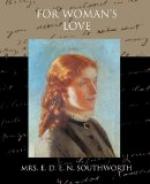“In the seventh year of their marriage, in desperation, the Reverend Raphael advertised his ability and readiness to ’prepare young men for college.’ He obtained but one pupil one Alfred Whyte, the son of a retired brewer. You perceive that he had the same surname with the young Ann, but it was spelled differently—with a y, instead of an i, as her name was. He seems to have been a fine, hearty, good natured young fellow, about twenty years of age, with a short, stout form, a round, red face, and dark eyes and hair. He hated study, but loved children, animals, and out-door sports. It was in the course of nature that he should fall in love with the fair fifteen-year-old beauty Ann White.
“She returned his affection because since her father’s death he was the only human being who had ever been kind to her. The first year that he spent at the parsonage was the happiest year Ann had ever known. Before it drew to an end, however, their happiness was clouded. The young man had over and over again assured the girl of his love for her, and at last he asked her to marry him. She consented. Then he wrote and asked permission of his father to wed the curate’s step-daughter.
“The answer might have been anticipated. The purse-proud retired brewer, who had dreams of his only son and heir going into Parliament and marrying some impoverished nobleman’s daughter, wrote two furious letters, one to his son, commanding his immediate return home, and another to the Rev. Raphael Rosslynn, reproaching him with having entrapped his pupil into an engagement with his pauper step-daughter.
“We can judge the effect of these letters upon the peace of the parsonage.
“The Reverend Raphael commanded his pupil into his presence, and after severely censuring him for his conduct in ’betraying the confidence of the family who had received him into its bosom,’ he requested that Master Whyte should leave the house with all convenient speed.
“The youth urged that he had meant no harm and had done no harm, that he was honestly in love with the young lady, and had honestly asked leave to marry her, and that he certainly would marry her—
“‘Though mammy and daddy and all gang mad.’
“Mr. Rosslynn referred him to his father’s letter and ordered him to depart. And then the reverend gentleman went to his wife’s room and bitterly reproached her that her forward girl had been the cause of his losing his pupil and eighty pounds a year.
“She told him that the fault was his own; that he should never have received a young man as a resident pupil in the house where there was a young girl.
“A fierce quarrel ensued, which was ended at last by the reverend gentleman going out and banging the door behind him with a force that shook the house, and in a state of mind that rendered him singularly unfit to read the prayers for the sick beside the bed of a dying parishioner to whom he was urgently summoned.




